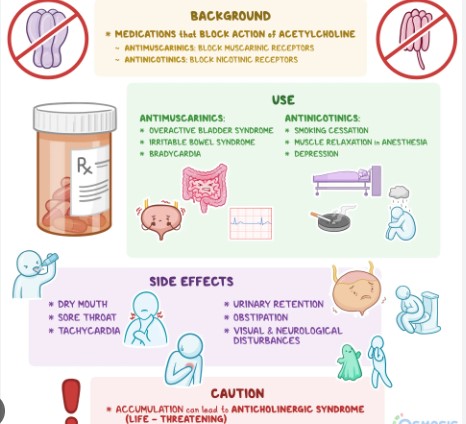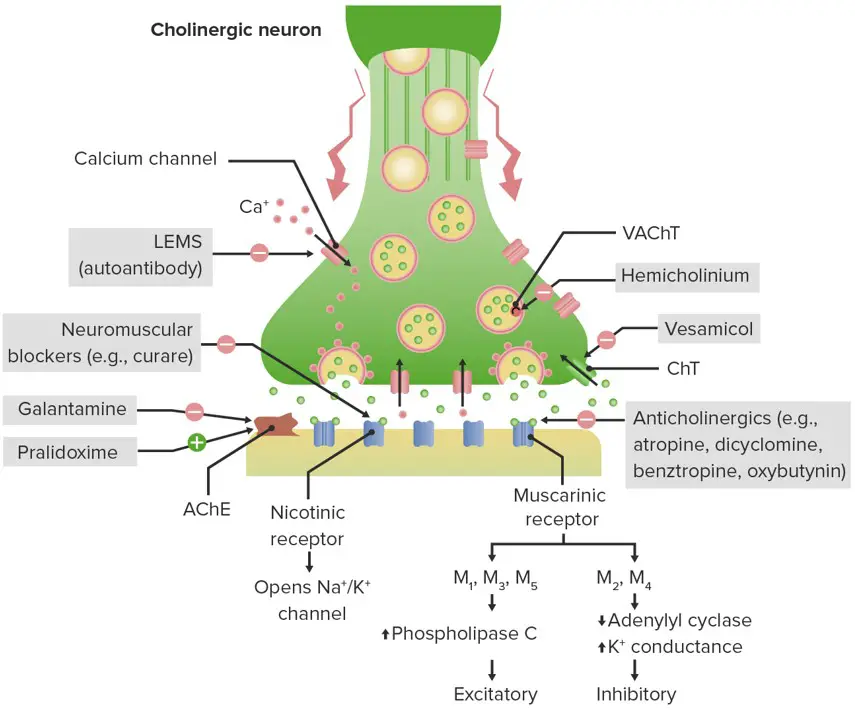Neurotransmitters play a pivotal role in how our body processes signals and reacts to the environment. Among these, cholinergic and anticholinergic pathways are essential, influencing various physiological and psychological functions. These systems, although they might sound obscure, impact everything from our heart rate to how we remember where we left our keys.
The key difference between cholinergic and anticholinergic lies in their action on nerve cells. Cholinergic pathways stimulate muscle movement and are involved in bodily functions that operate unconsciously, like breathing and heartbeat. Conversely, anticholinergic pathways inhibit these actions, affecting functions across the nervous system and reducing bodily secretions.
These pathways are not just biological terms but have practical implications in medicine and daily life. They help us understand conditions like Alzheimer’s and guide the use of certain medications. Knowing how these systems work can offer insights into many aspects of health and wellness, influencing everything from pharmaceuticals to the management of chronic diseases.

Cholinergic Basics
Definition and Function
Cholinergic systems in the body refer to the structure and function of nerve cells that use acetylcholine as a neurotransmitter. This chemical messenger plays an integral role in transmitting messages between nerve cells and muscles, or within various areas of the brain. Acetylcholine is pivotal for motor control, as well as regulating activities in the autonomic nervous system, which includes the heart rate, digestion, and salivation.
Key Neurotransmitters
The primary neurotransmitter for cholinergic systems is acetylcholine. This substance is crucial for many functions in the body and brain, acting as a chemical mediator that nerves release to communicate with muscles, or other nerves in the case of brain functions. The ability of acetylcholine to bind to receptors determines the response of the cell it targets, which can either stimulate or inhibit specific actions depending on the receptor type.
Role in the Body
The cholinergic system’s role in the body is broad and significant:
- Muscle Activation: It stimulates muscle contraction in both skeletal and smooth muscles, enabling movement and support of various body functions like breathing and blood flow.
- Autonomic Nervous System Regulation: It affects internal organs by managing functions carried out without conscious thought, including digestion and glandular secretions.
- Cognitive Functions: In the brain, acetylcholine is essential for attention, learning, and memory. It is particularly significant in areas of the brain that process complex cognitive tasks.
Anticholinergic Basics
Definition and Function
Anticholinergic agents affect the body by blocking the action of acetylcholine in the nervous system. These agents inhibit the binding of acetylcholine to its receptors, which can reduce muscle spasms, decrease bodily secretions, and alter nerve signaling. The primary role of anticholinergic drugs is to counteract the effects of the cholinergic system, providing therapeutic benefits in conditions where overactivity of the cholinergic system is problematic.
Key Neurotransmitters
While anticholinergic drugs do not directly utilize neurotransmitters, they influence the activity of acetylcholine by blocking its receptors. These drugs are used to inhibit the parasympathetic nervous system’s functions, effectively reducing unwanted muscle movements and fluid secretions in the body and eyes, providing symptomatic relief in various medical conditions.
Role in the Body
The roles of anticholinergic systems include:
- Inhibition of Muscle Movements: Particularly useful in treating diseases like Parkinson’s, where excessive muscle movement is a problem.
- Reduction of Secretions: Effective in managing conditions like COPD and asthma, where reduction of mucus secretion is beneficial.
- Neurological Impact: They are used to treat nerve-related symptoms, including those of motion sickness and certain psychiatric disorders.
Comparative Analysis
Signal Transmission Processes
Cholinergic and anticholinergic pathways have opposite effects on the nervous system due to their modes of action at the cellular level. Cholinergic actions stimulate cells by enhancing acetylcholine release and receptor binding, promoting activity. In contrast, anticholinergic actions block these receptors, preventing acetylcholine from binding, which suppresses cell activity.
Effects on the Nervous System
These differences have profound effects on the nervous system:
- Cholinergic effects generally promote neurotransmission, enhancing bodily functions such as muscle movement and glandular activity.
- Anticholinergic effects typically inhibit these functions, which can be beneficial in cases where reduction of overactive bodily functions is necessary.
Physiological Impacts
Cholinergic on Organ Systems
Cholinergic impacts on organ systems are largely stimulatory:
- Digestive System: Enhances digestion by increasing enzyme secretion and gut motility.
- Cardiovascular System: Influences heart rate and blood pressure through its action on heart muscle and blood vessels.
- Respiratory System: Affects bronchial muscle tone and mucus secretion, impacting breathing.
Anticholinergic on Organ Systems
Anticholinergic effects are primarily inhibitory:
- Digestive System: Reduces salivation, gut motility, and can lead to constipation.
- Cardiovascular System: Can cause an increase in heart rate and decrease in mucous membrane secretions.
- Respiratory System: Reduces bronchial secretions and can relieve asthma symptoms by relaxing the airways.

Pharmacological Uses
Cholinergic Drugs and Their Uses
Cholinergic drugs are medications that either mimic or enhance the action of acetylcholine, a key neurotransmitter involved in many important functions of the body. These drugs have a wide range of applications:
- Treatment of Myasthenia Gravis: Enhances muscle strength by increasing neuromuscular transmission.
- Glaucoma Therapy: Reduces intraocular pressure by increasing fluid outflow from the eye.
- Alzheimer’s Disease: Improves cognition and slows down symptom progression by enhancing cholinergic neurotransmission in the brain.
Cholinergic drugs are vital in managing diseases that involve the neuromuscular junction and are also used in diagnosing conditions like asthma.
Anticholinergic Drugs and Their Uses
Anticholinergic drugs work by blocking the action of acetylcholine at nerve synapses. These medications are crucial in treating a variety of conditions:
- Parkinson’s Disease: Reduces muscle rigidity and tremors.
- Overactive Bladder: Decreases urinary urgency and frequency by relaxing the bladder muscles.
- COPD and Asthma: Opens airways and reduces mucus production, aiding in easier breathing.
These drugs are commonly used in the treatment of motion sickness, and to reduce saliva production during surgery.
Side Effects and Risks
Common Side Effects: Cholinergic
While cholinergic drugs are beneficial, they come with potential side effects, including:
- Gastrointestinal Distress: Including increased gastric acid production leading to stomach pain.
- Excessive Salivation and Sweating: Can be uncomfortable and socially inhibiting.
- Muscle Cramps and Weakness: Due to overstimulation of muscles.
These effects are usually dose-dependent and can be managed with proper medical guidance.
Common Side Effects: Anticholinergic
Anticholinergic drugs also present side effects, particularly in the elderly:
- Dry Mouth and Eyes: Can lead to discomfort and eye health issues.
- Constipation and Urinary Retention: Can significantly affect quality of life.
- Confusion and Drowsiness: Particularly concerning in the elderly, potentially leading to falls.
Awareness and monitoring are key to managing these side effects in patients undergoing treatment.
Real World Applications
Cholinergic in Medical Treatments
Cholinergic systems’ understanding has significantly enhanced the treatment of various medical conditions:
- Neuromuscular Disorders: Effective in managing symptoms and improving life quality.
- Digestive System Diseases: Used to treat conditions like gastroparesis by enhancing gut motility.
- Cognitive Disorders: Plays a role in managing dementia and similar cognitive impairments where cholinergic systems are compromised.
Anticholinergic in Everyday Products
Anticholinergic compounds are not only found in prescription medications but also in over-the-counter products:
- Antihistamines: Commonly used for allergy relief.
- Sleep Aids: Often have anticholinergic properties to promote drowsiness.
- Bronchodilators: Used in inhalers to treat asthma by relaxing the airways.
These everyday uses make anticholinergic drugs a staple in many households.
Research and Innovations
Recent Studies on Cholinergic Effects
Recent research has shed light on the nuanced roles of cholinergic systems in health and disease:
- Neuroprotection: Studies suggest cholinergic agonists may protect against neurodegeneration.
- Cancer Research: Exploring the implications of cholinergic modulation in tumor growth and metastasis.
These studies offer promising directions for future therapeutic applications.
Advances in Anticholinergic Treatments
The development of new anticholinergic drugs has focused on reducing side effects and increasing specificity:
- Targeted Therapies: Aim to reduce systemic effects and focus on specific receptors.
- Long-Acting Formulations: Enhance patient compliance by reducing the frequency of dosing.
The innovation in anticholinergic therapy continues to evolve, driven by a deeper understanding of its underlying pharmacology.

Frequently Asked Questions
What Are Cholinergic Pathways?
Cholinergic pathways involve nerve cells that use acetylcholine as their neurotransmitter. These are critical for activating muscles and are heavily involved in the parasympathetic nervous system, which manages bodily functions at rest, such as digestion and salivation.
How Do Anticholinergic Drugs Work?
Anticholinergic drugs work by blocking acetylcholine receptors in the central and the peripheral nervous system. This blockage can reduce muscle spasms, decrease bodily secretions, and alleviate various symptoms of diseases like Parkinson’s and asthma.
What Are the Effects of Cholinergic Drugs?
Cholinergic drugs mimic the action of acetylcholine, increasing communication between nerve cells. They are used to treat diseases like glaucoma and Alzheimer’s by enhancing muscle contraction and cognitive function.
Are Anticholinergic Effects Dangerous?
While useful in treating several conditions, anticholinergic effects can be dangerous, especially in the elderly. They can cause confusion, constipation, dry mouth, and in severe cases, memory loss. It’s crucial to use them under strict medical supervision.
Conclusion
Cholinergic and anticholinergic pathways represent crucial aspects of neurochemical balance in the human body, influencing a range of functions from basic motor skills to complex brain activities. Their roles in medical treatment are equally vital, offering solutions and relief for various conditions but not without risks.
Understanding these pathways enriches our knowledge of human physiology and aids in the sophisticated handling of numerous medical conditions. As research progresses, the potential to refine and expand their applications continues to grow, promising better health outcomes and deeper insights into the workings of the human body.

